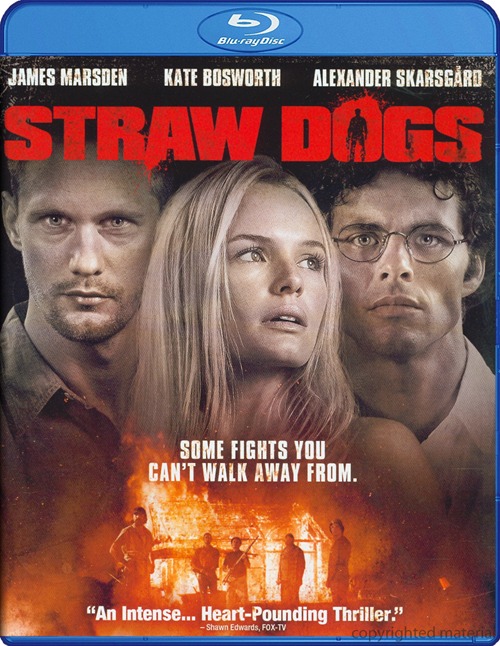CHICAGO – Patrick McDonald of HollywoodChicago.com appears on “The Morning Mess” with Dan Baker on WBGR-FM (Monroe, Wisconsin) on March 21st, 2024, reviewing the new streaming series “Manhunt” – based on the bestseller by James L. Swanson – currently streaming on Apple TV+.
Blu-ray Review: ‘Straw Dogs’ Remake Fails to Equal Power of Original Film
CHICAGO – The 2011 remake of Sam Peckinpah’s galvanizing 1971 classic is a film destined to appeal to no one. It’s not poorly made, and the writer/director Rod Lurie is gifted at crafting suspenseful morality tales (such as the under-appreciated “Nothing But the Truth”). But it’s difficult to understand why Lurie would bother putting his personal stamp on a picture that he considers repugnant.
By taking the moral high ground and cutting out the original film’s offensive content, Lurie has entirely lost the point of Peckinpah’s tale, and instead veered into severely hypocritical territory. If “Straw Dogs” isn’t about the animalistic nature of man, then what’s left to explore? It’s like draining the anti-Semitism out of “Triumph of the Will.” Lurie has essentially taken Peckinpah’s blueprint and morphed it into one of those maddening “Get the Hell Out Of There” idiot plots inhabited by one-note predators and their thick-headed prey.
 Blu-ray Rating: 2.0/5.0 |
James Marsden is miscast in the role forever immortalized by Dustin Hoffman. He plays David, a sensitive newlywed whose intellectualism carries hints of condescension after he moves with his wife, Amy (Kate Bosworth), to her Southern hometown. He’s barely arrived when he first meets Amy’s old flame, Charlie (Alexander Skarsgård of “True Blood” fame), an overgrown adolescent practically dripping with malevolence. It’s clear he still has feelings for Amy, and yet David still freely allows him and his cronies to fix their roof. It’s stunning to behold the countless bouquets of red flags that are thrust upon the couple’s doorstep before being completely ignored. There are multiple times in which David’s life is threatened while his wife is ogled to an unseemly degree. Since Lurie has stripped away the darkness in both of his protagonists, he has eliminated their reason for staying so long in such a dangerous town. When the couple finds their cat’s limp body hanging from a noose in the closet, what do they do? They go to a football game. To call the film’s events wildly improbable would be to put it lightly. Lurie complains that Peckinpah’s film lacked any truthful connection to the human psyche, but at least it remained consistent with the auteur’s warped worldview. This “enlightened” retread makes no sense at all.

Straw Dogs was released on Blu-ray and DVD on Dec. 20, 2011.
Photo credit: Sony Pictures Home Entertainment
Regardless of the film’s gaping flaws, there are a few aspects that are worth admiring. Marsden and Bosworth do a fine job of portraying a relationship during its first uncertain days following the honeymoon phase. There are several inspired song choices on the soundtrack, while composer Larry Groupé brings an operatic dimension to various sequences. Yet the moments destined to linger in viewer’s minds are saved for the blood-spattered finale. The effects artists do a particularly superb job with a freeze frame-worthy shot involving a bear trap. Yet since there’s little depth or meaning to the violence, it all amounts to a straight-faced version of “Home Alone.” For a vastly superior meditation on similar themes, check out Ole Bornedal’s 2009 Danish gem, “Deliver Us From Evil.”
“Straw Dogs” is presented in 1080p High Definition (with a 2.40:1 aspect ratio), accompanied by English, French, Spanish and descriptive audio tracks, and includes an audio commentary that proves Lurie had done his homework prior to filming. He cites quotes by Harold Pinter and studio executives to back up his criticisms of the film, while discussing Peckinpah’s “pessimistic” beliefs in sociobiology, Robert Ardrey, “The Territorial Imperative” and “African Genesis.” Lurie says that his remake aims to counter Peckinpah’s sociopolitical philosophies, yet by sanitizing the message, he’s just made another routine thriller that simultaneously glorifies and condemns the ugliness of violence. Amy no longer smiles after being raped, and David no longer finds pleasure in killing his attackers. Though the director applauds himself for making a film that’s far more respectful toward women, his Southern caricatures are even more offensive. Instead of following Peckinpah’s belief that violence ultimately expresses mankind’s “primitive thirst for blood,” he blames the animalistic behavior of Charlie and his pals merely on “how they were raised.”
The director is absent on the disc’s four featurettes, thus leaving his collaborators to echo his vision. Key differences between the original and remake are highlighted, such as the change in location from England to America, and David’s job switch from mathematician to screenwriter. Production designer Tony Fanning gave Amy’s home the colonial structure and architecture that often housed officers during the Civil War, thus bringing echoes of history to the simmering conflict between enemies. While Lurie theoretically denies mankind’s thirst for blood, he appeals to the audience’s bloodlust with gallons of crowd-pleasing gore. What a deeply confused film.
 | By MATT FAGERHOLM |


